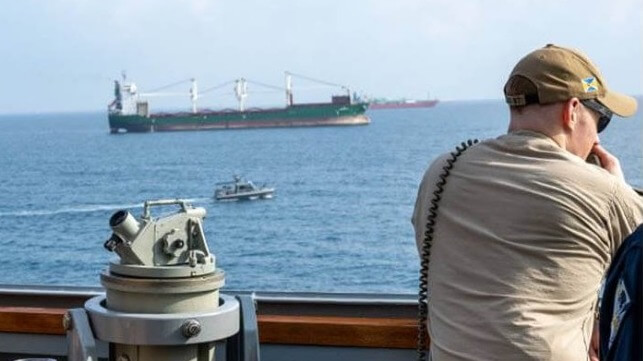Industry Groups Advise on Steps with Continuing Houthi Threats

Seven of the leading shipping industry trade groups worked together to issue a joint statement today offering advice for ships operating in the Southern Red Sea and the Gulf of Aden. They are advising on the dangers and procedures ships that continue to choose to sail in the area should consider.
The latest advisory comes as the UK’s Secretary of State for Defence Grant Shapps told Parliament today that the Houthis are still intent on attacking shipping after three rounds of joint U.S.-UK strikes and multiple attacks by the U.S. on weapon systems and missiles loaded for launch. Shapps said the recent assaults, “We not an escalation. We have already successfully targeted launchers and storage sites involved in Houthi attacks, and I am confident that our latest strikes have further degraded the Houthis’ capabilities.”
Shipping companies however continue to take different approaches. CMA CGM confirmed today that it has diverted all services initially routed via the Red Sea after the attempted attacks on a vessel it has under charter. However, a Chinese shipping company Sea Legend Shipping is promoting that it is still making the transits telling Chinese media that five of its vessels were escorted by the Chinese Navy.
The advisory issued by groups including BIMCO, Intercargo, Intertanko, and the International Chamber of Shipping, warns of the dangers of anti-ship missiles, anti-ship ballistic missiles, water-borne improvised explosive devices, and drones. They also report mines have been known to drift from Houthi ports into the shipping lanes and most recently unmanned undersea vehicles have been reported. They also warn the Houthis may also masquerade as the Yemeni Coastguard.
Furthermore, they note that the Bab el-Mandeb Strait is narrow with the northbound traffic lanes no more than seven nautical miles from the Yemeni coastline. However, they note the Houthis are believed to have struck as far as 100 nautical miles from the coast into the Gulf of Aden.
The groups call for a voyage-specific threat and risk assessment as well as consulting with flag states. While they note that the threats were against Israeli, U.S., and UK shipping, “vessels could be misidentified and understand their risk of collateral damage.”
They note that the accuracy of the data being used by the Houthi to target ships is uncertain and the links between targets are sometimes unclear. The EUNAVFOR operation has also warned that the Houthi may be using outdated data. For ships heading to Israeli ports, they recommend limiting information access.
Today’s alert especially advises ships recently acquired from an Israeli-associated company to ensure vessel systems such as AIS are updated. However, they warn that turning off AIS does not necessarily make a ship safer. They note it limits the allied navies' ability to track a ship’s progress and recommend reporting to NAVCENT NCAGS and UKMTO every two to three hours while making the transit.

that matters most
Get the latest maritime news delivered to your inbox daily.
They warn of the extra challenges of seeing attacks at night, while some of the other military authorities have said the danger might be less at night. The advisory recommends steps including maintaining lookouts for the entire passage, regardless of time, use of citadels/safe areas, and vessel hardening while also saying tankers “should ensure that their inert gas systems are available for immediate use.”
Vessels contacted by “Yemeni Navy” should ignore the instructions and notify the collation warships. They instruct vessels to “resist the requests to divert course.”
